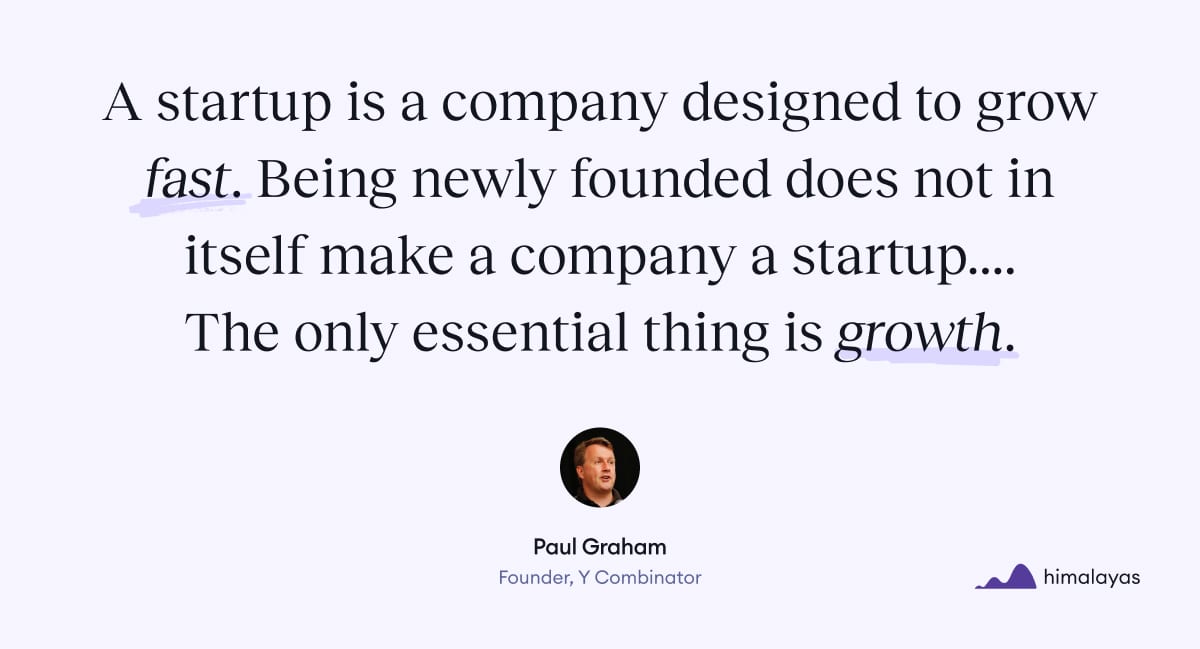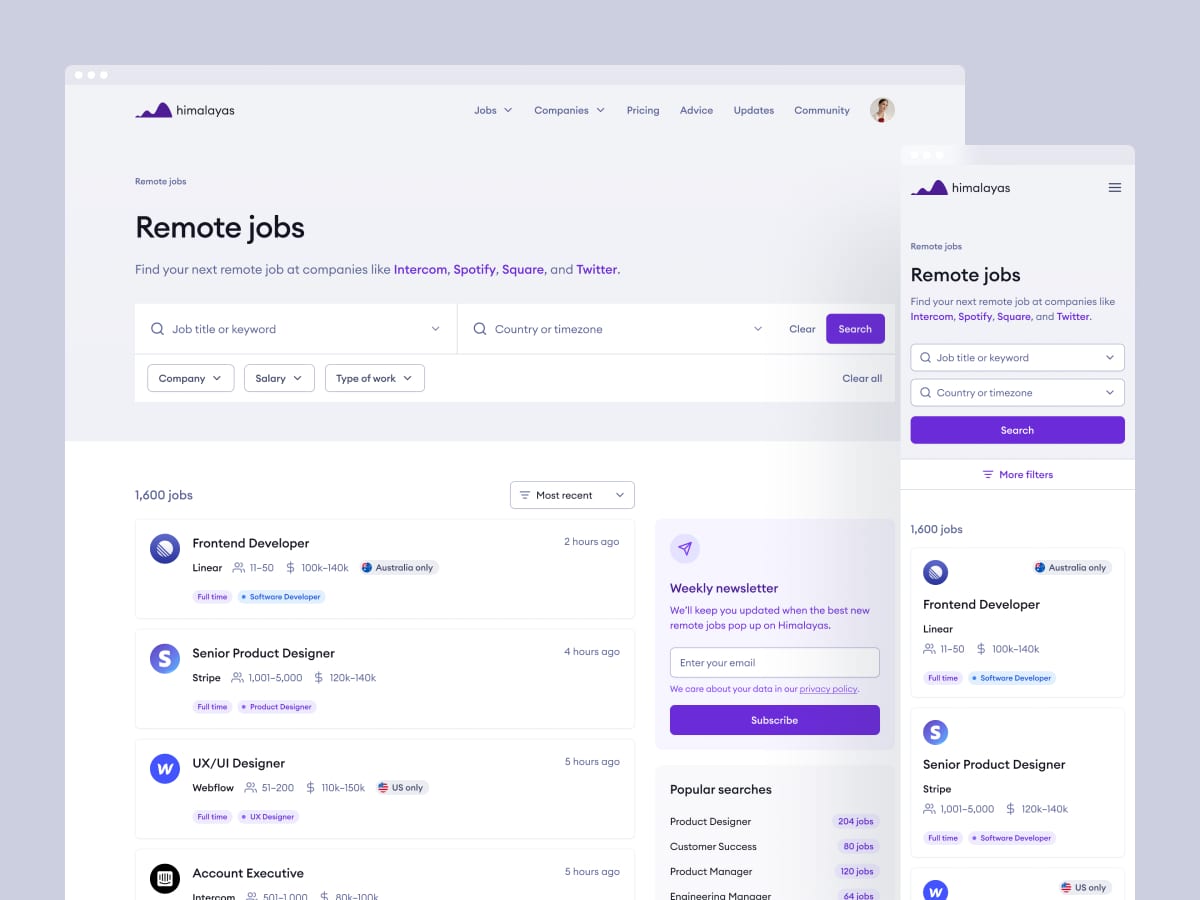Working at a startup can either be career suicide or an excellent career move depending on who you ask. We'd argue for the latter.
Working at a startup is a great way to develop new skills in less time than you would in the corporate world. It also allows you to work on a new product and grow with the new company. In many cases, you'll also earn equity along with your paycheck.
Think of joining a startup as more than just joining a company. You're entering the startup world, which can lead to starting your own company or, more commonly, working at multiple startups and then founding a company, becoming an investor, or joining a scale-up.
But finding a job at a startup can be difficult if you don't know where to look. Smaller startups often don't post jobs, lack formal interview processes, and when they do, the job descriptions don't match the reality of the work.
That's not to say the startup environment isn't worth joining. It is. The opportunity to create new things with smaller teams means you get more exposure to different things and can upskill fast.
We recommend following John Lilly's advice:
"When thinking about what to do next, think about the long game — you'll be working with people in different ways in our industry for the next 20–30 years. So make sure you pick great people to work with and learn with."
What is a startup?

Paul Graham, the co-founder of Y Combinator, defined a startup in his essay, Startup = Growth, as:
"A company designed to grow fast. Being newly founded does not in itself make a company a startup. Nor is it necessary for a startup to work on technology, or take venture funding, or have some sort of 'exit.' The only essential thing is growth. Everything else we associate with startups follows from growth. If you want to start one, it's important to understand that. Startups are so hard that you can't be pointed off to the side and hope to succeed. You have to know that growth is what you're after. The good news is, if you get growth, everything else tends to fall into place. Which means you can use growth like a compass to make almost every decision you face."
In short, startup companies focus on growth. So while they're commonly in the tech industry, they don't have to be.
Why you should work at a startup

Most people join or start companies to work on a product they love, with people they respect and avoid the bureaucracy associated with a traditional corporate job.
We spend a significant portion of our time working, so it's a good idea to think about where you're going to work and whether it's with the right people.
Outside of product and people, you need to assess your rate of learning. The faster you learn, the more your knowledge compounds over time, and the better you'll be over the long term.
Focusing on the long term is the best, easiest, and most straightforward career hack.

Peter Thiel, founder of PayPal and Palantir, billionaire investor (first outside investor in Facebook and investor in 100+ other startups), and author of the Zero to One put it best:
"We tend to massively underestimate the compounding returns of intelligence. As humans, we need to solve big problems. If you graduate Stanford at 22 and Google recruits you, you'll work a 9-to-5. It's probably more like an 11-to-3 in terms of hard work. They'll pay well. It's relaxing. But what they are actually doing is paying you to accept a much lower intellectual growth rate. When you recognize that intelligence is compounding, the cost of that missing long-term compounding is enormous. They're not giving you the best opportunity of your life. Then a scary thing can happen: You might realize one day that you've lost your competitive edge. You won't be the best anymore. You won't be able to fall in love with new stuff. Things are cushy where you are. You get complacent and stall."

Kyle Tibbits, CMO of Wander, says, "The most valuable compensation for working at a startup as opposed to a "normal job" is a dramatically higher rate-of-learning (ROL)."
Increasing your rate of learning makes it easier to grow into senior roles sooner, either at your current company or the next place you join. It's common to see people who join startups go from a junior position to a "head of" position in less than two years as long as their rate of learning remains faster than company growth.
If you're young, follow this advice from Joe Lonsdale, co-founder of Palantir and co-founding partner of Formation 8:
"If you're really good at what you do, and you want to buy a nice house, you have to invest well. Your main investment at 22 is your time… that's the only investment that matters. I'd argue you should take a longer view and make sure you're also learning as much as you can the next five years. Fortunately, you can probably do both by joining a young hyper-growth business that has lots of top people in it and pushing for a low salary and high equity. There is a comfortable myth among naive outsiders that everything here is a crapshoot and people like my friends and I just keep getting lucky lots of times in a row. There are probably lots of psychological reasons they need to believe this. And maybe they are right, and there are similarly strong psychological reasons why it'd be hard for me to accept that some of my friends and I who have been involved in several big wins are just the luckiest people vs having a good strategy or some other insight about what's working."
Why you shouldn’t work at a startup

There are downsides to working at a company in its early days:
- You might have to work long hours: Startup companies are always understaffed, so you might need to work longer hours than a traditional 9-to-5, including weekends. If you're not up for that, a startup experience might not be the right choice for you. If you enjoy hard work at currently work at an established company, consider sending a job application to startups you're interested in as you may get better upside working at a newer company. Not all startups work long hours. It depends on the startup's culture. For example, Bolt is known for its four-day workweek.
- Less structure and more uncertainty: Startups don't have the same processes or training and development programs as large companies. They may not even have a dedicated human resources department to onboard you or a manager to tell you what to do. If it's early, they may not even have a way for you to send in a job application. In exchange for this uncertainty, new hires get to do a lot of stuff and can have as much responsibility as they can handle. Chances are, if you have a good idea for the company's product, you'll be able to work on it. Unlike corporate jobs, there's generally no one to tell you not to work on something.
- Less mentoring and management: Founders of fast-growing companies suffer from a chronic lack of people with management experience. If you're a job seeker looking to be tightly mentored and managed, a startup company might not be the right place. However, if you're happy to create your workload and teach yourself new skills, promotions can come quickly. You can learn the basics of management by reading High Output Management by Andy Grove.
- Pay can be lower than the market rate: This depends heavily on the company you join, its stage, and whether it's bootstrapping or VC-funded. However, many startups pay at or above the market rate, particularly if you're a software engineer.
- Startups fail, and your equity may be worthless: Not every startup succeeds, so while you're earning equity, it may not be worth anything. The value of your equity largely depends on the company you join and the company's stage.
- Your experience at a big company may not transfer over as well as you think: Working at an established company teaches you how to work for big companies. Things that work at a large company won't scale down to the early days. It can even hinder your ability to land a job at a startup because working at a big company often signals that you plan to spend your career at big companies and expect big tech perks.
How to pick a startup company to join

Sam Altman, former president of Y Combinator and current CEO of OpenAI, has the best advice on how to pick a startup:
"If you join a company, my general advice is to join a company on a breakout trajectory. There are usually a handful of these at a time, and they are usually identifiable to a smart young person. They are a very good risk/reward tradeoff. Such a company is almost certainly going to be successful, but the rest of the world isn't quite as convinced of it as they should be. Fortunately, these companies love ambitious young people. In addition to the equity being a great deal (you might get 1/10th of the equity you'd get if you join a tiny new startup but at 1/100th or 1/1000th of the risk), you will work with very good people, learn what success looks like, and get a W on your record (which turns out to be quite valuable). Spending a few years at a company that fails has path consequences, and working at an already-massively-successful company means you will learn much less, and probably work with less impressive people.
Incidentally, don't let salary be a factor. I just watched someone turn down one of these breakout companies because Microsoft offered him $30k per year more in salary — that was a terrible decision. He will not build interesting things and may not work with smart people. "
Another way to think about it is to ask yourself this question from Mark Suster, managing partner of Upfront Ventures: Is it time for you to learn or earn?
If it's time to learn, look at startups that offer one or more of the following:
- A network of talented executives and VCs
- More responsibility than your last job
- Specific industry or technical skills that'll help you in the future
- A chance to join companies that will allow you to meet interesting people
In addition to Sam and Mark's advice, Elad Gil, founder of Color Genomics, author of High Growth Handbook, and investor in Airbnb, Airtable, Anduril, Brex, Checkr, Coinbase, Flexport, Gitlab, Gusto, Instacart, Opendoor, PagerDuty, Pinterest, Samsara, Square, Stripe, and Wish suggests overweighting and underweighting certain factors:
"Factors to overweight:
- Network
- Market and Growth Rate
- Optionality
- Brand
Factors that don't matter as much as you think:
- Role
- Compensation"
Elad's advice is in line with the advice Sheryl Sandberg, COO of Facebook, got from Eric Schmidt, former CEO of Google:
"Get on a rocket ship. When companies are growing quickly and they are having a lot of impact, careers take care of themselves. And when companies aren't growing quickly or their missions don't matter as much, that's when stagnation and politics come in. If you're offered a seat on a rocket ship, don't ask what seat. Just get on."
What startups look for in employees

Startups need all the skills required at any other company. Some prior startup experience is helpful but knowing about the company you're applying to is crucial.
If you research the company and are passionate about it, chances are you'll be able to land a role if you try hard enough. However, you'll have the most success if you're a product designer, software engineer, marketing manager, growth manager, product manager, or work in sales.
While it's true that software engineers have the most straightforward job search, it's a myth that you need to be technical. There's a lot of demand for individuals with soft skills.
Most startups will need to hire non-technical talent pretty quickly. Regardless of your role, there are specific traits that startups look for in potential hires:
- Ability to learn fast: Startup employees need to quickly research, parse, and understand new concepts and markets. Even if you can't implement the solution yourself, you need to communicate with engineers and learn about how the product works.
- Understanding of the market: This helps you develop potential solutions, speak confidently with potential customers, and act as a knowledgeable public-facing entity for the company.
- Curiosity: Startups change a lot, so you need to like change. You need to adapt and evolve at the same pace as the organization because the role you're hired for probably won't be the role you're doing a year later. It takes a learning machine to thrive in this environment, so always be learning.
- Humility: You can have a huge impact and take on more responsibility than you could in a corporate environment, which is why working at a startup is appealing. However, you also need to be ready to roll up your sleeves and work on unglamorous, essential work like putting your desk together on your first day.
- Passion: The best new hires at every startup are already active users or advocates for the company's products or services. Not only does this passion come through in the interview process, but it can also help them provide an informed perspective from day one.
- Researchers: The competition for talent is fierce. The best talent gets the best offers, and the best companies get the best applicants. If you're applying for a hot startup, invest time into your application by writing a tailored cover letter and resume. Make sure to read the job description carefully, as some startups embed a request in there to ensure you aren't taking a spray-and-pray approach to your job hunt.
- Builders: Saying your passion about building without having anything to show is far less convincing than someone else who has built a project or two on the weekend. Even if you can't code, there are options like Webflow, Substack, or Ghost that let anyone create.
- Be so good they can't ignore you. If you want the job, be so good (and persistent) that the startup can't ignore you. You could develop a website that shows how you'd improve a specific part of the product, add value for them for free, create an online community about the product, or launch a small side project that compliments the company.
Where to find startup salary information

Startup compensation can be composed of several comments, including a base salary, equity compensation, or a performance bonus.
An excellent place to find potential compensation for Startups is AngelList's Startup Salary and Equity Tool. Select the role, skill, and market to view salaries and equity information about thousands of startups.
You can also use sites like PayScale and Glassdoor.
Keep in mind your total compensation will consist of your salary, equity options, vesting schedule, cliff, acceleration, bonuses, and severance pay. Most commonly, you'll have a four-year vesting schedule with a one-year cliff, no acceleration, no bonus or one based on the discretion of your manager, and no severance.
To translate the above sentence, this means you'll earn your equity over four years, typically on a monthly cadence after your one-year cliff (no equity until you reach 12 months). No acceleration means that you won't vest all your equity if the company is acquired.
How to research startups

When you're researching a startup, you want to understand:
- The company: You need to understand the company's past, present, and future and whether you agree with the strategy. Don't work somewhere that you don't respect and admire.
- Company culture: Not every startup offers impressive perks like unlimited paid leave, table tennis, and free lunch. Assumptions like these can lead to disappointment.
- Customers: What do their customers think? Do they love the product, or are they using it because there is nothing better? Don't sell anything you wouldn't buy yourself.
- Competition: If you get the job, who will be your competitors? Are they a well-funded and nimble startup or a slow, entrenched incumbent? Is the market fragmented or concentrated?
Below are a few places you can use to accelerate your research:
- The company's website: Obvious but overlooked. Read through the company's website, blog, press releases, and changelog to get an understanding of what they're working on and where they're going.
- Himalayas: Our company profiles include company information, tech stack, and employee benefits.
- AngelList: The best international job board for startups.
- Crunchbase: Crunchbase is a platform for finding business information about private and public companies.
- Glassdoor: While not dedicated to startups, Glassdoor can be a great place to find out what employees think about a company. Do your due diligence and look up the startup founders to see what other startups they've built and if there are any reports on what it's like to work for them.
Where to find startup jobs

- Use job sites: You no longer have to move to San Francisco to work in tech. Remote work has opened up opportunities for everyone, regardless of geography. On Himalayas, you can view compensation information about hundreds of jobs, and soon you'll be able to a profile to share your work experience, projects, and relevant skills. You can also look at more traditional job boards and search for the word "startup," but you'll generally have a better time during your job search by using a dedicated startup job board like AngelList. See our list of the best remote job sites and read our guide to finding a remote job.
- Reach out to companies directly: Use Himalayas' company database to explore the hundreds of remote startups and reach out. The startup world is small, and one of the best ways to get an interview is to show the founder or hiring manager that you are passionate about the company. One thing to consider is companies may not even post to job boards and prefer to get referrals from existing team members. An excellent cold email goes a long way.
- Use your network: Many people find jobs at startups by networking with existing employees. If you're interested in a particular startup, check LinkedIn to see if you know anyone working there. Better yet, use Twitter, develop a public profile and meet the founders online.
- Meetups: Meetups are a great place to meet new people, hiring managers, employees, or founders.
- Venture capital firms: Many VC firms have job boards or talent programs designed to help people find jobs at their portfolio companies.
- Use social media: Follow companies you're interested in on social media. You might be able to land an interview by replying to a tweet, engaging with employees on Twitter, or via a job post on LinkedIn.
How to prepare for a startup interview

Many startups hire in a faster and less formal style than big companies. That said, most still use job interviews, so you should do your best to prepare.
Here are a few guidelines to help you when interviewing at a startup:
- Stop selling and start engaging: The best way for you and the hiring manager to determine if you're a good fit is to have a thoughtful and engaging discussion. If the interview only involves the interviewer asking you questions and giving answers that you think will impress them, you won't get very far. See our guide on the best questions to ask in an interview.
- Don't talk in sound bites and buzzwords: If you find yourself repeating the same stories over and over, it's going to be an unproductive meeting. While the STAR framework is excellent for answering behavioral interview questions, the most important thing is to answer the question.
- Don't agree with everything they say: Everyone is wrong sometimes. Startups want people who are comfortable disagreeing with current strategies and providing new ideas. If you agree with everything the interviewer says, they'll be left wondering how you'll contribute if you're working together to solve problems.
- Ask tough questions: You're going to be spending a considerable portion of your time at the company, think about the risks and downsides of the company or role, and ask questions to get more context.
- Ask lots of questions about things that matter to you: While reviewing a company's website before the interview can give you some background, there is nothing better than hearing it from the horse's mouth. Asking questions also helps the interviewer learn more about how you think.
- Be honest.
And while many startups are generally less formal than traditional companies, remember to make an effort in your appearance. The halo effect is a real thing.
Finally, always follow up with a thank-you email.
How to evaluate a startup job offer

When you get a job offer from a startup, you must carefully evaluate the compensation package and fit with the company culture. You must understand the equity portion of the offer by assessing:
- The number of options: The number of shares you'll be entitled to at the end of your vesting schedule.
- Strike price: The fixed price per share at which you can purchase your stock
- Exercise window: How long you have to exercise your options at the strike price. When you leave, it's essential to understand this as many startups have short exercises windows for leavers.
- Cliff: A typical vesting schedule is over four years with a one-year cliff, which means you get 0% vesting for the first 12 months, 25% vesting at the 12th month, and 1/48th (2.08%) more vesting each month until the 48th month.
- Tax implications: Outside the scope of this article, but be sure to understand any tax implications when you exercise your options.
One way to look at it is to consider the equity portion of your compensation as $0. Unless the startup is successful, chances are you won't see anything from those options for a long time. So, if you treat them as $0 and make less than you currently are on the salary portion, you need to consider everything else before you accept.
Treating equity as worthless isn't necessarily the right way to think about it. If you pick a well-funded mid-stage startup, there is a decent chance your equity will be worth something. It's up to you to decide how much you value equity versus salary.
Remember, you will need to pay for your options. They're not free. Options have a strike price which may be low or high depending on when you join the company.
In general, you should ask yourself: How does my compensation compare to my peers in the company?
Some companies pay more, some pay less, but an offer is fair if it's in line with your peers. A peer joined the company at roughly the same time as you with the same job title.
Other factors could be important to you, including those that aren't financial. The job could be a stepping stone to starting your own company or meeting the people you work with for the next few decades.
Remember, your tenure at a startup doesn't have to be forever. Even if your options become worthless, you'll still have the opportunity to expand your skill set, develop your resume, and build valuable professional experience.







